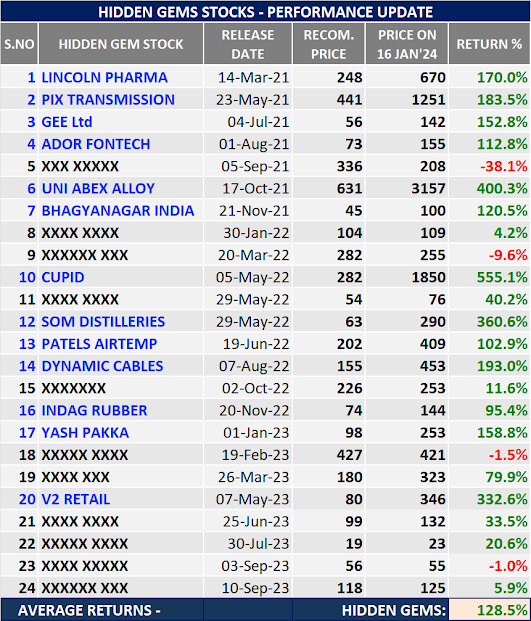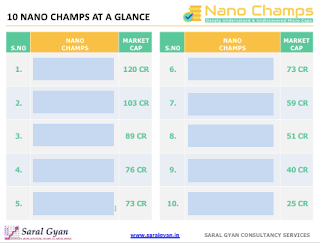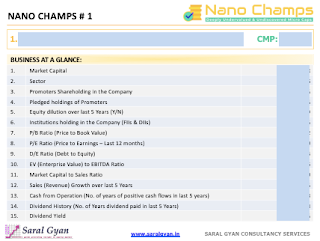Dear Reader,
Why is a stock that cost Rs. 50 cheaper than another stock priced at Rs. 10?
This question opens a point that often confuses beginning investors: The per-share price of a stock is thought to convey some sense of value relative to other stocks. Nothing could be farther from the truth.
In fact, except for its use in some calculations, the per-share price is virtually meaningless to investors doing fundamental analysis. If you follow the technical analysis route to stock selection, it’s a different story, but for now let’s stick with fundamental analysis.
The reason we aren’t concerned with per-share price is that it is always changing and, since each company has a different number of outstanding shares, it doesn’t give us a clue to the value of the company. For that number, we need the market capitalization or market cap number.
The market cap is found by multiplying the per-share price times the total number of outstanding shares. This number gives you the total value of the company or stated another way, what it would cost to buy the whole company on the open market.
Here’s an example:
Stock price: Rs. 50
Outstanding shares: 5 Crores
Market cap: Rs. 50 x 50,000,000 = Rs. 250 Crores
To prove our opening sentence, look at this second example:
Stock price: Rs. 10
Outstanding shares: 30 Crores
Market cap: Rs. 10 x 300,000,000 = Rs. 300 Crores
This is how you should look at these two companies for evaluation purposes. Their per-share prices tell you nothing by themselves.
What does market cap tell you?
First, it gives you a starting place for evaluation. When looking a stock, it should always be in a context. How does the company compare to others of a similar size in the same industry?
The market generally classifies stocks into three categories:
• Small Cap under Rs. 1000 Crores
• Mid Cap Rs. 1000 - Rs. 10000 Crores
• Large Cap above Rs. 10000 Crores
Some analysts use different numbers and others add micro caps and mega caps, however the important point is to understand the value of comparing companies of similar size during your evaluation. You will also use market cap in your screens when looking for a certain size company to balance your portfolio. Don’t get hung up on the per-share price of a stock when making your evaluation. It really doesn't tell you much. Focus instead on the market cap to get a picture of the company’s value in the market place.
IMP Note: This article is written to safe-guard our readers who are new to stock market, and make them understand about the actual facts. We keep on receiving mails from our readers regarding the price range of stocks we covers under our Hidden Gems or Value Picks service. The misconception in mind of new investors is regarding the stock price, majority of them believe that if stock price is less, like below Rs. 50 or even below Rs. 10, changes of stock price appreciation is very high and they can buy more no. of shares rather than buying a limited no. of shares of high priced stock.
We have a reader base covering almost all major states in India and from 20 other countries across globe. During the last 10 years we have interacted with several investors seeking multibagger return from stocks.
It was 17th Dec 2011, we covered Cera Sanitaryware as Hidden Gem stock of the month at price of Rs 157, later it went up to Rs. 450 in period of 15 months. Based on strong quarterly numbers, attractive valuations and consistent performance, we suggested adding it up again in the range of 400-450 which was taken as a surprise by our members as we received several queries and feedback.
Below are some of the common queries of our subscribers which often lead them to opportunity losses.
1. How come a stock priced at Rs 450 can generate Multibagger returns?
2. Cera is almost 3 times moving from 170 to 450, why are you suggesting buy again?
3. Where is the room to generate Multibagger return from this level?
4. I don’t like such high-priced stock, please give me stocks priced below Rs. 100.
5. I want to buy more no. of shares, hence please recommend low price stocks below Rs. 10.
Cera Sanitaryware touched its life time high of Rs 9740 this year and currently trading around Rs. 7810, Cera is a 50-Bagger stock in 12 years from our initial coverage and is a 18X stock from our reiterated buy at Rs. 450, which was not liked by our subscribers.
The story does not end here, there is a long way to go. Our suggested stocks is with a view-point of 2-3 years at least and not just 6 to 12 months. If fundamentals of the company are intact, we would not suggest our members to do profit booking or exit. Investors who stayed away just because of high price simply missed yet another opportunity. We held Cera for long term and suggested complete profit booking to our members in the stock around 3500 - 4000 levels in 2017.
There is a general misconception among the investors that high priced stocks can't generate multibagger returns. They often think that high-priced stocks are overvalued. In terms of valuation, a 50 rupees stock may not be cheaper than that of a 1000 rupees stock. There is no co-relation between the valuation and market price of a stock. To understand whether a company is small or large, you must look at market cap of the company and not at stock price. To judge valuation you must have to look at Price to earning ratio, Price to book ratio, market cap to sales ratio etc.
Lets try to understand this with an example, Rajratan Global Wires share price was Rs. 54.77 on 30 Nov 2017 (stock split and bonus issue adjusted price, actual price was 639). Today the stock price is at Rs. 774 giving absolute returns of 1313% i.e. more than 14 times in 6 years against double digit return of Sensex in the same period. In fact, we already advised partial profit booking in Rajratan Global Wires to our Hidden Gems at Rs. 1300, booking returns of 2270% (almost 24X) in period of 5 years.
We suggested Buy on Rajratan Global Wires at price of Rs. 639 under Hidden Gems service on 30 Nov 2017 and if any of our subscribers have not invested in the company thinking he/she can get only 15 shares by investing Rs. 10,000 has made a big mistake. Today those 15 shares have increased to 175 shares on account of bonus shares issued by the company in the ratio of 4:3 in 2019 and later stock split of 1 shares into 5 shares (face value of Rs. 10 to Rs 2 per share) in March 2022. And the current share price of Rs. 774 is still very high for those who looks at low price stock.
There are many examples like above by which we can illustrate that there’s nothing called high price. Multibagger returns is not dependent on the current market price of a stock, so don't be afraid of investing in high priced stock. You need to look at fundamentals like future growth prospects of the company, PE ratio, PB ratio, ROE, ROCE, debt on books, EV/EBITDA, cash reserves along with other parameters to judge a stock whether it is undervalued or overvalued. We agree with you that judging valuation is not an easy task. So, take expert’s advise when ever required.
Another misconception among investors is to buy more no. of shares. They often think that its better to buy more no. of shares of a low price scrip (ranging below Rs. 10 or say below Rs. 50) instead of buying less no. of shares of high priced stocks. They often think that low price stocks can generate multibagger return quickly. During last 5 years, we have reviewed many portfolio of our members under Wealth-Builder subscription, we have noticed that many of their portfolio is filled with such low-priced stocks and most of those are in great loss because of poor fundamentals. You may think that a two rupees stock can easily generate multibagger returns even if it touch to Rs. 10. At the same time don’t forget that the same stock can even come down to Rs. 0 levels which can evaporate all your investment giving you 100% loss! In terms of valuation a two thousand rupees stock may not be expensive than that of a two rupees stock.
Lets try to understand this also with a simple example, Lanco Infratech was a well-known company from Infrastructure sector. At the beginning of 2010 the stock was around Rs 55. After 10 years, it was hovering at just Rs 1.30 and today its not operational any more. Those who purchased the stock during 2010 are in 100% loss! Rs. 1 lakh invested in Lanco Infratech in Jan 2010 was valued at merely Rs. 2,000 in 2020, a complete wealth-destroyer! Isn't it? Those who bought this stock at levels of Rs. 30 and later again at Rs. 10 or Rs. 5 to average out thinking that stock has came down from all time highs of Rs. 85 are still waiting to get their buying price back. There are many such stocks like Suzlon Energy, GMR Infra, GVK Power and Infrastructure etc which have continuously destroyed wealth of investors over a period of last 5 to 10 years.
We do not state that all low price stocks are wealth-destroyers, it all depends on the fundamentals of the company. So, do ensure that you check out the fundamentals and valuations while investing in stocks instead of looking at stock price. Please get out of the misconception that low priced stocks will fly high faster giving you extra-ordinary returns. Always remember that stock price is just a barometer, actual valuations of a company can be determined by its fundamentals.
If you wish to invest in fundamentally strong micro, small and mid cap companies which can give you far superior returns compared to major indices like Sensex or Nifty in long term and help you creating wealth, you can join our services like Nano Champs, Hidden Gems & Value Picks & Wealth-Builder.
The stocks we reveal through Nano Champs, Hidden Gems & Value Picks are companies that either under-researched or not covered by other stock brokers and research firms. We keep on updating our members on our past recommendation suggesting them whether to hold / buy or sell stocks on the basis of company's performance and future outlook.
Do write to us at info@saralgyan.in in case of any queries, we will be delighted to assist you.
Team - Saral Gyan

 Home
Home Saral Gyan Freebies
Saral Gyan Freebies Saral Gyan Services
Saral Gyan Services About Us
About Us Contact Us
Contact Us

























